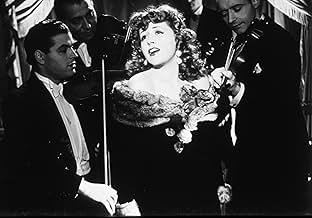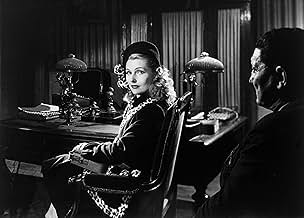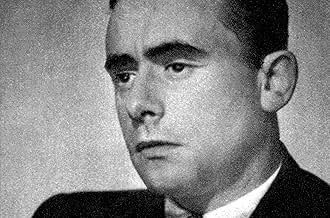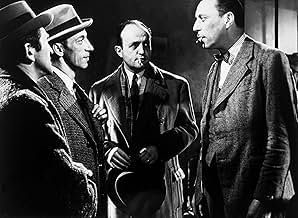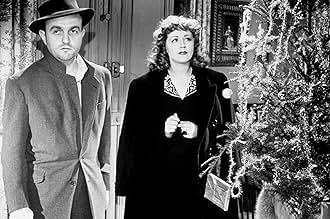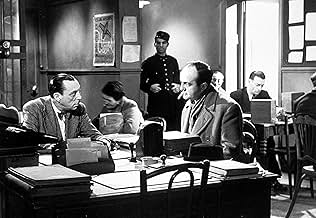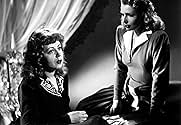AVALIAÇÃO DA IMDb
7,7/10
6,7 mil
SUA AVALIAÇÃO
Um marido ciumento pretende matar o homem que sua esposa está encontrando para negócios, mas chega e descobre que a ação já está feita.Um marido ciumento pretende matar o homem que sua esposa está encontrando para negócios, mas chega e descobre que a ação já está feita.Um marido ciumento pretende matar o homem que sua esposa está encontrando para negócios, mas chega e descobre que a ação já está feita.
- Direção
- Roteiristas
- Artistas
- Prêmios
- 2 vitórias e 1 indicação no total
Henri Arius
- Léopardi
- (as Arius)
Charles Blavette
- Le gendarme Poitevin
- (as Blavette)
René Blancard
- Le commissaire principal de la P.J.
- (as R. Blancard)
Robert Dalban
- Paulo
- (as R. Dalban)
Jean Daurand
- L'inspecteur Picard
- (as J. Daurand)
Jean Dunot
- Nitram
- (as J. Dunot)
Jacques Grétillat
- Auguste
- (as J. Grétillat)
Gilberte Géniat
- Mme Beauvoir
- (as G. Géniat)
Gabriel Gobin
- Le patron du bistrot
- (as G. Gobin)
François Joux
- L' officier de police Fayard
- (as F. Joux)
Avaliações em destaque
First of all,there is a detective story:"légitime défense" by Belgian Stanislas André Steeman whose "l'assassin habite au 21" Clouzot had already transferred to the screen in 1942,with Pierre Fresnay and the same actress Suzy Delair.Steeman complained about Clouzot's adaptation for both movies.The movie from 1942 was excellent,but the "detective story" side had been kept,so why complaining?As for "Quai des orfèvres",Clouzot was now in a new phase of his brilliant career.After having directed "le corbeau" and been blacklisted,he had a lot more to say than a simple whodunit.Steeman complained essentially about the poor detective ending,which I will not reveal of course,but Clouzot focused on the social vignettes,on his characters's psychology,and he did not give a damn about the puzzle à la Agatha Christie.By doing so,he becomes the genuine predecessor of CLaude Chabrol who has always been closer to him than to Alfred Hitchcock whom he admires much though. Suzy Delair has great screen presence,and you will love the song she really sings(she was a singer too)"avec son tralala".Bernard Blier gives ,as ever,a sparing of gestures and words performance,and he really pulls it off .Two characters are particularly interesting and disturbing:the first one,Dora,the photographer:she takes pictures of female models ,and Clouzot,by subtle touches,reveals us she's a lesbian.Of course,the word is never uttered(How could it be in 1947?) The police chief (fabulous Louis Jouvet) tells her:"You and me,WE are not lucky with women."The portrait of this cop is very detailed:we learn a lot of things about him,not necessarily connected with the Delair/Blier plot:he's a widower ,with a son he adores and who runs into school difficulties,particularly in geometry.So we get to know all the characters in depth.One of the most important manifesto of post-war French cinema.
H.G. Cluozot had difficulties working in France after he had made "Le Corbeau" in 1943 which was produced by the German company and later judged by French as a piece of anti-French propaganda. Louis Jouvet, an admirer of Clouzot's work, invited him to direct a thriller "Quai des Orfevres" where he played an ambiguous police inspector investigating a murder that happened in Paris Music Hall. Without each other knowledge, the seductive cabaret singer Jenny Lamoure (Suzy Delair) and her jealous piano-accompanist husband Maurice who is madly in love with her (Bertrand Blier, father of director Bertrand Blier) trying to cover up (without each other's knowledge) what they believe to be their involvement in the murder? Enters tenacious policeman (Louis Jouvet) who is determined to discover the truth. Jouvet practically stole the movie with wonderfully cynic and sentimental in the same time performance. "His character, his eagle-like profile and his unique way of speaking made him unforgettable." "Quai des Orfevres", witty and atmospheric observation of human weaknesses was a great comeback of H.G. Cluozot, the fine director, "French Hitchcock".
Quai des Orfèvres is directed by Henri-Georges Clouzot and Clouzot co-writes the screenplay with Jean Ferry. It is based on the novel Legitime defense written by Stanislas-André Steeman . it stars Louis Jouvet, Suzy Delair, Bernard Blier and Simone Renant. Music is by Francis Lopez and cinematography by Armand Thirard.
When high profile business man Georges Brignon is found murdered all evidence points to jealous husband Maurice Martineau - Inspector Antoine takes up the case.
Following the backlash and fallout from Le Corbeau in 1943, Henri-Georges Clouzot wasn't allowed to make a film for four years, his return brought about Quai des Orfevres. Although a highly respected master of his craft, Clouzot was frowned upon for the dark approach to human nature in some of his films, whilst his treatment of the actors under his direction is legendary in a bad way. So how interesting to find that his comeback picture is actually one of his most accessible, very much thriving on human interest factors for literally everyone in the picture!
This a traditional police who done it procedural in core essence, one that does come with coincidences and contrivances, and yet the characters are so richly drawn, their lives so compelling, that the simplicity of plot is actually irrelevant. We are in post war Paris and the back drop is the world of theatre and nightclubs. Clouzot offers up in the fist instance some film noir staples, a possible femme fatale, gay love from afar, cuckold husband and a grotesque murder victim. Even the acts on the stage have a weirdness to them, Wheeling Winos - one with a paper mache head! Dogs that walk on their hind legs! How wonderful. The clubs are smoky, the streets dimly lighted for menacing atmosphere, Clouzot and Thirard have created a splendid moody world from which to spin the tale.
I'll take him for a ride, and what a ride!
Pitched at the front is Jenny Lamour (Delair), who is not beyond using her sexuality to further her stage career, which of course doesn't sit well with her highly jealous husband Maurice (Blier), a man clearly punching above his weight with Jenny. Ah but Clouzot is a crafty devil, he has let us into a secret that undermines us the viewer's expectations and that of Maurice. This keeps the question of who is the murderer - and the motive - as a constant intrigue. There's little slices of sexy sauce to tantalise, and the whole play developes into a sort of tragic comedy, but always the characterisations of the key players are earthy and dealing in foibles. Then Inspector Antoine (Jouvet excellent) holds court, a grumpy but stoically deceptive man of his work, film noir has itself another policeman of note.
Visually there's some treats, such as the dark shadowy walk that Maurice takes to Villa St Marceaux, arriving at the house which instantly looks like a noir nightmare. Better still is a sequence as we get towards the denouement, Maurice in a holding pen, a sexy lady in the pen next door, as bells ring out she is framed in shadowed bars whilst Maurice's mind begins to fracture. The craft on show is sublime at times, visually and on the page. I'm not over enamoured with Delair as an actress, but conversely Renant is quality and gorgeous into the bargain, while I think the ending should have really gone into black hearted territory. All told though, and this is Clouzot's least suspenseful film that I have seen, this is well worthy of time investment for lovers of classic French cinema. 7.5/10
When high profile business man Georges Brignon is found murdered all evidence points to jealous husband Maurice Martineau - Inspector Antoine takes up the case.
Following the backlash and fallout from Le Corbeau in 1943, Henri-Georges Clouzot wasn't allowed to make a film for four years, his return brought about Quai des Orfevres. Although a highly respected master of his craft, Clouzot was frowned upon for the dark approach to human nature in some of his films, whilst his treatment of the actors under his direction is legendary in a bad way. So how interesting to find that his comeback picture is actually one of his most accessible, very much thriving on human interest factors for literally everyone in the picture!
This a traditional police who done it procedural in core essence, one that does come with coincidences and contrivances, and yet the characters are so richly drawn, their lives so compelling, that the simplicity of plot is actually irrelevant. We are in post war Paris and the back drop is the world of theatre and nightclubs. Clouzot offers up in the fist instance some film noir staples, a possible femme fatale, gay love from afar, cuckold husband and a grotesque murder victim. Even the acts on the stage have a weirdness to them, Wheeling Winos - one with a paper mache head! Dogs that walk on their hind legs! How wonderful. The clubs are smoky, the streets dimly lighted for menacing atmosphere, Clouzot and Thirard have created a splendid moody world from which to spin the tale.
I'll take him for a ride, and what a ride!
Pitched at the front is Jenny Lamour (Delair), who is not beyond using her sexuality to further her stage career, which of course doesn't sit well with her highly jealous husband Maurice (Blier), a man clearly punching above his weight with Jenny. Ah but Clouzot is a crafty devil, he has let us into a secret that undermines us the viewer's expectations and that of Maurice. This keeps the question of who is the murderer - and the motive - as a constant intrigue. There's little slices of sexy sauce to tantalise, and the whole play developes into a sort of tragic comedy, but always the characterisations of the key players are earthy and dealing in foibles. Then Inspector Antoine (Jouvet excellent) holds court, a grumpy but stoically deceptive man of his work, film noir has itself another policeman of note.
Visually there's some treats, such as the dark shadowy walk that Maurice takes to Villa St Marceaux, arriving at the house which instantly looks like a noir nightmare. Better still is a sequence as we get towards the denouement, Maurice in a holding pen, a sexy lady in the pen next door, as bells ring out she is framed in shadowed bars whilst Maurice's mind begins to fracture. The craft on show is sublime at times, visually and on the page. I'm not over enamoured with Delair as an actress, but conversely Renant is quality and gorgeous into the bargain, while I think the ending should have really gone into black hearted territory. All told though, and this is Clouzot's least suspenseful film that I have seen, this is well worthy of time investment for lovers of classic French cinema. 7.5/10
A nice, humorous mix of music hall (in the first third mostly) and police procedural mystery as the various suspects' stories start to collapse. The final exposure of the murder may come as a surprise if you don't watch closely. A gritty look at Paris of the time. You can ignore the final scene (the Hollywood ending). Louis Jouvet is best as the police inspector who seems to be just passing through, but is really on top of things.
Henri-Georges Clouzot's "Quai des Orfevres" (1947) stars Suzy Delair, Bernard Blier, Louis Jouvet, and Charles Dullin. The story takes place in post-war Paris, where an accompanist, Maurice Martineau (Blier) lives with his singer wife, Marguerite, better known as Jenny Lamour (Suzy Delair). An important man, Georges Brignon (Dullin) promises Jenny work, and because she's ambitious, she flirts with him. Maurice is an extremely jealous man, so he finds Brignon in a restaurant and threatens him.
Later on, Jenny tells Maurice she is visiting her grandmother, who lives in another town. This gives Maurice a good opportunity to bump off Brignon, especially when he finds the man's address on a piece of paper in the kitchen and realizes Jenny was lying. But when he gets to Brignon's house, Brignon is already dead.
Inspector Antoine (Juvet) is assigned to the case, and it doesn't take him long to realize that some alibis aren't very secure.
Wonderful film, with the excellent Juvet outstanding as Inspector Antoine, and an excellent performance by Simone Renant as a lesbian photographer, Dora, in love with Jenny. Delair, who was involved with Clouzot, is good as a lower-class woman who loves her husband but wants to get ahead in show business as well.
This is Clouzot at his best, with a witty script with some plot twists and a true Parisian atmosphere.
Later on, Jenny tells Maurice she is visiting her grandmother, who lives in another town. This gives Maurice a good opportunity to bump off Brignon, especially when he finds the man's address on a piece of paper in the kitchen and realizes Jenny was lying. But when he gets to Brignon's house, Brignon is already dead.
Inspector Antoine (Juvet) is assigned to the case, and it doesn't take him long to realize that some alibis aren't very secure.
Wonderful film, with the excellent Juvet outstanding as Inspector Antoine, and an excellent performance by Simone Renant as a lesbian photographer, Dora, in love with Jenny. Delair, who was involved with Clouzot, is good as a lower-class woman who loves her husband but wants to get ahead in show business as well.
This is Clouzot at his best, with a witty script with some plot twists and a true Parisian atmosphere.
Você sabia?
- CuriosidadesHenri-Georges Clouzot wrote almost two-thirds of the film only having read the novel years before, recalling it from memory, since it was out of print by the time he started the screenplay. When the novelist Stanislas-André Steeman saw the film, he was furious about the differences between the novel and the film.
- Erros de gravaçãoWhen Antoine is repeating Maurice's deposition to the typist, he says that the confrontation between Maurice and Brignon at the restaurant took place on Wednesday, December 2, 1946. In 1946, December 2 fell on a Monday.
- Citações
L'inspecteur adjoint Antoine: I have to admit, I've taken a liking to you, Miss Dora Monier.
Dora Monier: Me?
L'inspecteur adjoint Antoine: Because I have to say, you're just my type. When it comes to women, we'll never have a chance.
- ConexõesEdited into Histoire(s) du cinéma: La monnaie de l'absolu (1999)
Principais escolhas
Faça login para avaliar e ver a lista de recomendações personalizadas
- How long is Jenny Lamour?Fornecido pela Alexa
Detalhes
- Data de lançamento
- País de origem
- Central de atendimento oficial
- Idioma
- Também conhecido como
- Jenny Lamour
- Locações de filme
- Paris, França(Exterior)
- Empresa de produção
- Consulte mais créditos da empresa na IMDbPro
Bilheteria
- Faturamento bruto nos EUA e Canadá
- US$ 180.974
- Fim de semana de estreia nos EUA e Canadá
- US$ 9.632
- 27 de out. de 2002
- Faturamento bruto mundial
- US$ 181.041
- Tempo de duração1 hora 46 minutos
- Cor
- Proporção
- 1.37 : 1
Contribua para esta página
Sugerir uma alteração ou adicionar conteúdo ausente

Principal brecha
By what name was Crime em Paris (1947) officially released in Canada in English?
Responda
![Assistir a Bande-annonce [OV]](https://m.media-amazon.com/images/M/MV5BMmI1MGQ3ZWItMWI3Yi00M2RhLTkwMzEtODUyZWE5NmVhZGRlXkEyXkFqcGdeQXRyYW5zY29kZS13b3JrZmxvdw@@._V1_QL75_UX500_CR0)
